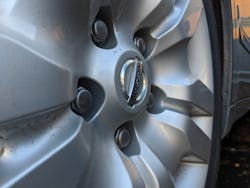First, let me say that in this industry, you are going to break something!
It is just inevitable that something will happen as you touch caps, use tools and complete tire rotations. Most of you budget for such issues each month. However, the one thing that is inexcusable is breaking something in someone's car because you did something wrong. This can cost your business thousands of dollars at one time and can make you go from black to red on the profit sheet. This month, I will discuss some of the simple things that you can do to prevent these from happening from the start.
Dipsticks
The easiest and most likely part that we break. This is even more of an issue on Chrysler and Dodge products due to their construction and location. What I tell technicians to do to avoid breaking a dipstick is to not just pull up but do a twist instead. As you pull up, if it is stuck, you are going to pull the handle right off.
If you simply do a slight twist on the head of the dipstick, you could pop it free of the gunk that builds up around it to start with. Pro tip: If you do break the head off one, there is a quicker solution than taking apart the tube to get it out. Keep a few wood screws in your toolbox and screw it into the remaining plastic. Take a pair of pliers and pull it right out and install the new one.
Oil Plugs and Pans
How many of you reading this have had to pay for an oil pan that you are just certain that you did not damage?
You may be right, but that rule of the last person to touch it will be in your patron’s mind. There are two things that you can do to prevent this from happening to you, one each for removing and installing plugs.
First, to reduce the risk of owning a pan when you start the service, just tap slightly tight before loosening. If it spins or is not tight, do not touch it! There is a possible stripped pan or missing threads on this pan. If you do repair work, get an estimate for repair to present to the customer. Do not just send them on their way. The second thing that you can do is invest in a $20 ⅜-inch torque ratchet. After you install your plug in the pan hand tight, finish up the job using the proper drain plug measurement to ensure that you are not breaking threads free on the inside or potentially cracking the pan.
Lugnuts and Studs
They are among the cheapest claims that you will probably have. You never know when it is going to happen unless you can see something visually wrong with the lug nut upon inspection. Always make sure that you have the right socket to remove the lug nuts. There are special sizes on some Ford and Dodge designs and if you do not have them, you will round off the lug nut. Invest in a special socket that removes rounded lug nuts in case this happens.
To lessen the chances of doing damage while installing the tires, always hand tighten down until you are up against the hub. This will allow you to tighten without stripping the stud that holds the lug nut on.
Engines
Let us just be honest. If this happens, then someone generally did not complete the job. We can talk all day long about air filter sales and whether we asked about that engine additive, but if you do not do the one thing the customer came to you to do, what does that say about the service center in the minds of the community.
There are three things that have usually happened when you have this type of claim. Most of them are caused by a lower bay technician who has either not tightened up a plug/filter or just put on the wrong filter. This causes rapid oil loss, and if a customer is not paying attention to that telltale oil light, then you get a lock up.
The other cause is much worse in the eyes of shop management and owners. How often have you seen where they just did not add the oil? I mean, really?! It is the one thing that you must do. The best way to combat this is training, training, and more training. You could install a quality inspection procedure where another person comes over to look over the car before it leaves. And if it's not right, the vehicle does not leave.
I hope that you can use some of these tips and tricks to help minimize your location’s warranty claims. When you make less mistakes, you will make more money and retain more of that valuable business.
Proper planning prevents poor performance!
About the Author

Adam Tatum
Adam Tatum is the Director of Operations for Virginia Lubes, a Jiffy Lube franchisee with 11 locations. He has over a decade of experience in the industry with a proven track record of building customer counts and sales, as well as using innovative ways to bring a new look to the automotive field for both the customer and the employee. Performance comes from growing your business through people.
